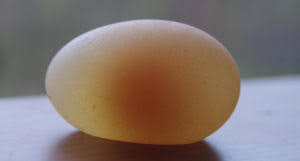 E- book offer of the day:
E- book offer of the day: 
 Poultry farming business report Volume 5
Poultry farming business report Volume 5
Why Chickens Laying Thin-shell Eggs (Physiological factors) and How to Prevent?
There are many reasons for layer chicken producing thin-shell eggs, such as being scared, lack of calcium, poor ventilation in the house, and infrequent disinfection. We can solve this problem by adding calcium to the feed, ventilating the house, and regular disinfection.
Physiological factors
 Learn More
Learn More1. Continuous egg production
Hens lay eggs continuously for a long period of time, which can easily lead to the decline of physiological functions, often making the eggshell thinner or producing soft-shell eggs. Therefore, to improve feed quality, increase animal protein feed, and often basking in the sun, strengthen feeding management, and promote laying hens to restore physiological functions as soon as possible, to ensure that the chickens can lay eggs normally.
2. Genetic factors
Different breeds of chickens have different eggshell qualities, such as native eggshells with thicker shells, and exotic breeds with thinner shells that are easily broken. Therefore, the selection method can be used to increase the thickness of the eggshell of the variety and reduce the egg breaking rate.
Invest in this knowledge-packed ebook promptly.  20 questions to ask your poultry farm manager everyday
20 questions to ask your poultry farm manager everyday
3. Egg-laying time
General chicken farms are fed around 8 am. During the day, the blood calcium concentration is high, and the calcium secretion of laying hens during egg formation is sufficient. Therefore, the egg shells produced in the afternoon are generally thick. Eggs laid before 10 a.m. are usually formed at night. Most hens are at rest at night. The food intake is very small and the blood calcium concentration is low. Therefore, eggs laid in the morning are generally thin.
READ ALSO 9 causes of decreased in egg production in poultry layers
4. Influence of age
Generally, older hens have larger eggs, but the eggshells are thinner. Therefore, it is generally appropriate to feed layers for 2 years.
5. Thyroid dysfunction
Thyroid dysfunction in chickens will seriously affect the absorption and utilization of calcium, thereby producing thin-shell eggs or soft-shell eggs. Feeding thyroxine tablets for 3-5 days can quickly harden the eggshell.
6. Moulting
Physiological changes during the hen’s moulting process will also make the eggshell thinner and increase the number of broken eggs. Therefore, it is necessary to use whole barley for chickens to eat freely for 3-5 days during the moulting period.
Invest in this knowledge-packed ebook promptly.  20 questions to ask your poultry farm manager everyday
20 questions to ask your poultry farm manager everyday
7.Frightened
The chicken is frightened, which disrupts the nerve function and endocrine gland function, which makes the calcium formation of the egg impaired, or the egg is excreted too fast, so that a soft-shell egg is born. The egg quickly returned to normal after the fright was lifted.
READ ALSO 6 ways to produce quality eggs in your poultry farm
8.Injured or sick
The hen is injured or sick, disturbing the metabolism of calcium and producing soft-shell eggs.
ATTENTION: Click “HERE” to join our WhatsApp group and receive More updates directly on your WhatsApp!
9.Protozoan schistosomiasis
In the early stage of protozoan schistosomiasis, soft-shell eggs are laid, and in the later stage, ovulatory shell fragments or liquid like lime water flows out. The production of soft-shelled eggs in chickens is a mistake in feeding and management, so care should be taken to keep the chicken house clean and dry, the air fresh and quiet, and to supply high-quality bone meal and fresh green feed according to actual needs can be resolved in time. If it is caused by protozoan fluke, treat it according to the disease, insert a small rubber tube into the esophagus and administer 2-3ml of carbon tetrachloride. The initial effect is significant.














